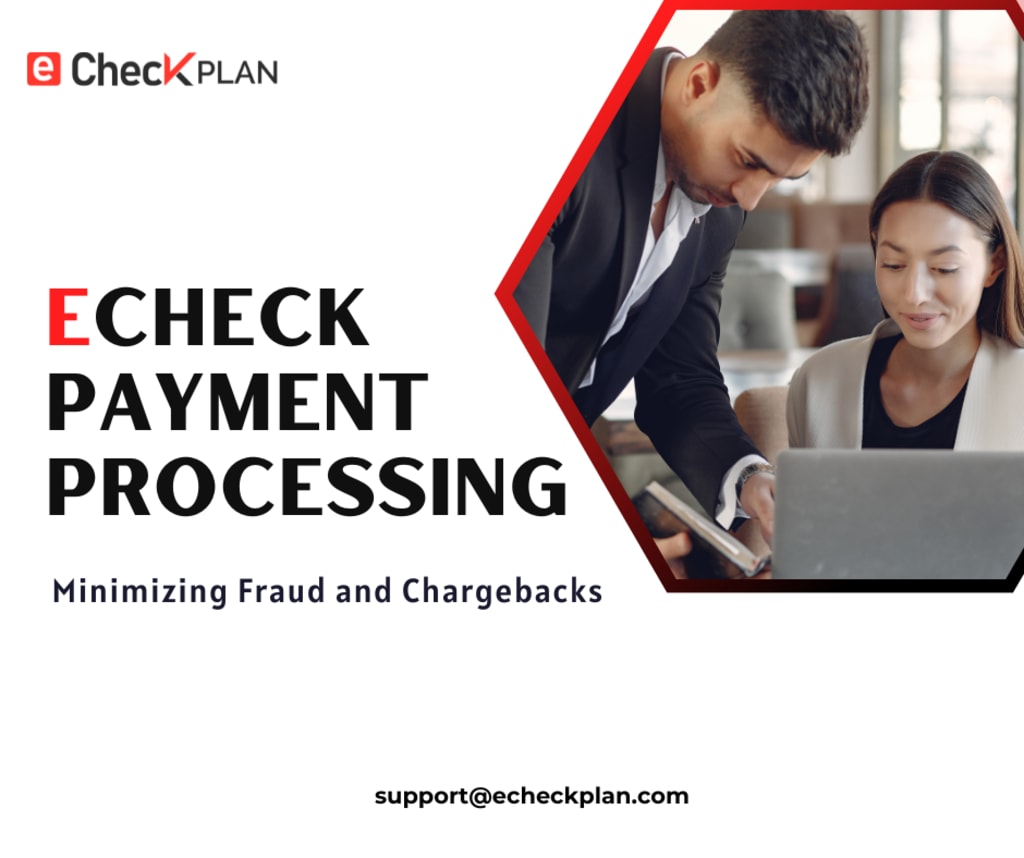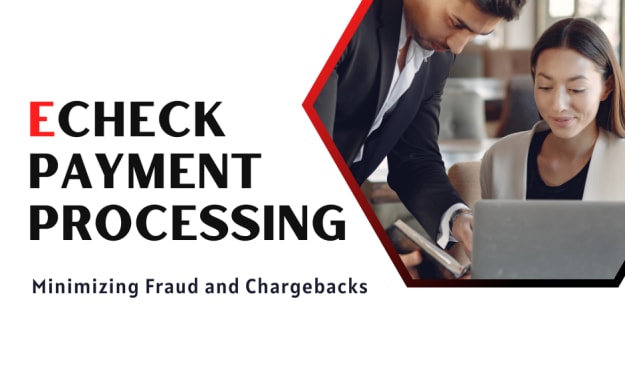Secure and Convenient: Echeck Payment Processing Made Easy
In today's digital age, payment processing has become an essential part of conducting business online. Customers expect seamless and secure payment options that offer convenience and peace of mind. One such payment method that has gained popularity is echeck payment processing. In this article, we will explore the benefits and convenience of echeck payments and how they have made online transactions easier for businesses and customers alike.

Table of Contents
1. Introduction
2. What is Echeck Payment Processing?
3. How Does Echeck Payment Processing Work?
4. The Advantages of Echeck Payment Processing
• 4.1 Security and Fraud Prevention
• 4.2 Convenience and Accessibility
• 4.3 Cost-Effectiveness
5. Setting Up Echeck Payment Processing
6. Integrating Echeck Payment Processing into Your Business
7. Best Practices for Echeck Payment Processing
8. Common Concerns and Misconceptions about Echeck Payments
• 8.1 Are Echeck Payments Safe?
• 8.2 Are Echecks Only for Businesses?
• 8.3 Can Echecks be used for International Transactions?
9. The Future of Echeck Payment Processing
10. Conclusion
11. FAQs
• FAQ 1: How long does it take for an echeck to clear?
• FAQ 2: Can I set up recurring payments with echecks?
• FAQ 3: What information do I need to provide for an echeck payment?
• FAQ 4: Are there any limitations on the amount I can process through echecks?
• FAQ 5: Can echecks be used for both B2B and B2C transactions?
1. Introduction
As online shopping and e-commerce continue to thrive, businesses are constantly seeking ways to improve their payment processing systems. Echeck payment processing offers a secure and convenient solution that benefits both merchants and consumers. This article will delve into the world of echeck payments, exploring its functionality, advantages, and best practices for implementation.
2. What is Echeck Payment Processing?
Echeck payment processing, also known as electronic check processing, enables businesses to accept payments from customers by electronically debiting funds from their checking accounts. It functions similarly to traditional paper checks, but instead of physically delivering the check to the bank, the transaction is processed electronically.
3. How Does Echeck Payment Processing Work?
When a customer initiates an echeck payment, their checking account information, including the bank account number and routing number, is securely transmitted to the payment processor. The payment processor then verifies the account details and processes the payment by debiting the specified amount from the customer's checking account. The funds are electronically transferred to the merchant's account, completing the transaction.
4. The Advantages of Echeck Payment Processing
4.1 Security and Fraud Prevention
Echeck payments offer robust security features to protect sensitive customer information. Encrypted transmissions and secure networks ensure that account details remain confidential during the payment process. Additionally, authentication measures such as digital signatures and verification protocols add an extra layer of security, reducing the risk of fraud.
4.2 Convenience and Accessibility
For customers, echeck payments provide a convenient payment option that eliminates the need for writing physical checks or carrying cash. Payments can be made online, over the phone, or through mobile applications, offering flexibility and accessibility. Furthermore, echecks are not limited to specific payment gateways or card networks, making them widely accepted across various platforms.
4.3 Cost-Effectiveness
Compared to other payment methods, such as credit cards, echeck payments often come with lower transaction fees. This cost-effectiveness is especially beneficial for businesses that process a high volume of transactions, as it helps reduce overall payment processing costs. Additionally, the elimination of paper checks reduces administrative expenses and improves efficiency.
5. Setting Up Echeck Payment Processing
To implement echeck payment processing, businesses need to partner with a reputable payment processor that offers this service. The payment processor will provide the necessary infrastructure and tools to facilitate echeck transactions securely. During the setup process, merchants will need to provide their business and banking information, undergo verification procedures, and agree to the terms and conditions of the payment processor.
6. Integrating Echeck Payment Processing into Your Business
Once the echeck payment processing system is set up, integration with the existing payment infrastructure is essential. Most payment processors provide developer-friendly APIs and plugins that enable seamless integration with popular e-commerce platforms and shopping carts. This integration ensures a smooth and streamlined checkout experience for customers, improving conversion rates and customer satisfaction.
7. Best Practices for Echeck Payment Processing
To optimize the benefits of echeck payment processing, businesses should adhere to certain best practices. Firstly, ensuring PCI compliance and maintaining robust security measures is crucial for safeguarding customer data. Additionally, offering transparent and clear refund and dispute resolution policies builds trust with customers. Regularly monitoring and reconciling echeck transactions helps identify any discrepancies or potential issues promptly.
8. Common Concerns and Misconceptions about Echeck Payments
8.1 Are Echeck Payments Safe?
Yes, echeck payments are safe when implemented correctly. The encryption and security measures employed by payment processors ensure the protection of sensitive customer information during the transaction process. However, it is essential for businesses to choose a reputable payment processor and follow best practices to maintain a secure payment environment.
8.2 Are Echecks Only for Businesses?
No, echecks can be used by both businesses and individuals. While businesses primarily leverage echeck payments for online transactions, individuals can also use echecks for various purposes such as paying bills or making purchases from participating merchants.
8.3 Can Echecks be Used for International Transactions?
Yes, echecks can be used for international transactions. However, it is essential to check with the payment processor regarding their international payment capabilities and any additional requirements or restrictions that may apply.
9. The Future of Echeck Payment Processing
The future of echeck payment processing looks promising as more businesses and consumers recognize its benefits. Technological advancements will further enhance security features, streamline processes, and improve accessibility. As a result, echecks are likely to become an increasingly popular payment method, offering secure and convenient transactions for businesses and customers worldwide.
10. Conclusion
Echeck payment processing offers businesses a secure and convenient alternative to traditional payment methods. With its robust security features, ease of use, and cost-effectiveness, echecks have revolutionized online transactions. By implementing echeck payment processing, businesses can enhance customer satisfaction, reduce payment processing costs, and streamline their financial operations.
11. FAQs
FAQ 1: How long does it take for an echeck to clear?
The time taken for an echeck to clear can vary depending on various factors such as the bank's processing time and any potential delays due to verification processes. Typically, it can take anywhere from a few business days to a week for an echeck to clear.
FAQ 2: Can I set up recurring payments with echecks?
Yes, many payment processors support recurring payments through echecks. This feature is particularly useful for businesses that offer subscription-based services or need to collect regular payments from customers.
FAQ 3: What information do I need to provide for an echeck payment?
To initiate an echeck payment, customers usually need to provide their bank account number, routing number, and authorization for the payment processor to debit their account.
FAQ 4: Are there any limitations on the amount I can process through echecks?
The specific limitations on the amount you can process through echecks may vary depending on the payment processor and your business's arrangement with them. It is recommended to check with your payment processor to understand any limitations or restrictions that apply.
FAQ 5: Can echecks be used for both B2B and B2C transactions?
Yes, echecks can be used for both business-to-business (B2B) and business-to-consumer (B2C) transactions. They offer a versatile payment solution suitable for a wide range of industries and business models.
In conclusion, echeck payment processing provides businesses and customers with a secure, convenient, and cost-effective solution for online transactions. By embracing echecks, businesses can improve their payment processing efficiency, enhance customer satisfaction, and stay ahead in the evolving digital landscape.
About the Creator
eCheckplan
ECheckplan is the leading payment facilitator bridging the gap between merchants and merchant account providers.






Comments
There are no comments for this story
Be the first to respond and start the conversation.